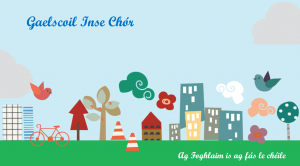The Code of Behaviour
School Statement
Gaelscoil Inse Chór is an all-Irish school in which all subjects, with the exception of English, are taught through the medium of the Irish language. Irish is the language of the school and a special emphasis is placed on our traditional culture.
Gaelscoil Inse Chór is a Roman Catholic school, under the patronage of the Archbishop of Dublin. Children of other religions/cultural backgrounds are also welcomed.
The aim of the school is to create a positive learning environment which enables each individual child to develop morally, spiritually, physically, academically and culturally. The Code of Behaviour helps to support that aim.
The Code of Behaviour is also essential in order to ensure the safety of the children, the staff and the school community. Gaelscoil expects the cooperation of everyone to implement the Code.
Gaeilge
Irish is the spoken language of the school. Pupils are expected to speak Irish inside the school at all times and at any outside events relating to the school. It is important to familiarise yourself with the centrality and importance of the Irish language in day to day school life and the point of enrollment. Information on the methods we use to promote the use of Irish through rewards and sanctions are to be found in this policy.
 Punctuality and attendance
Punctuality and attendance
- School starts at 8.50 each morning and every child is expected to be standing in the schoolyard (or in the hall on wet days) in their class line at that time. In the case of any child who is on the school grounds before 8.50 a.m., their parent/minder is responsible for their care up to that time.
- The normal school day finishes at 1.30 p.m. for infants, junior and senior, and at 2.30 p.m. for Classes 1 – 6. In the case of children who arrive at school late or who leave early, their parent/guardian is asked to sign the attendance book which is outside the school office. Again, parents/minders are responsible for the care of their children from their school finishing time.
- The school day ends for all children at 12.30 p.m. on the first Thursday of each month, to facilitate staff meetings.
- Regular attendance at school is expected from every child.
- When a child is absent from school, a letter of explanation is expected on their first day back at school.
- The school is obliged to inform the National Education Welfare Board of any child’s absence, when that child misses 20 school days in one school year.
General Safety
- Good behaviour is expected of all children at all times; and they are expected to be polite and kind to each other and to adults.
- Gaelscoil Inse Chór does not tolerate bullying of any kind and the school’s Bullying Policy is followed in all alleged instances. Copies of this policy are available from the school office.
- Toys are not to be brought to school except with the class teacher’s permission.
- Children are not permitted to bring Smart-phones to school under any circumstance. If a phone is absolutely necessary a mobile phone may be permitted. Permission must be sought from the class teacher with an explanation provided.
- Children are not permitted to use computers without the supervision of a teacher.
- Each person inside the school building walks at all times except during physical education classes.
- On wet days, when the children proceed directly to the school hall, parents and guardians are asked to leave upon the Principal’s arrival.
- All children walk under a teacher’s supervision to the school buses or to the collection points in front of the school when it’s time to go home.
- Parents/guardians are asked to fill in a form, to nominate the person/s who collects their child/ren from school. If the arrangement changes, the school must be informed and the form must be amended as necessary.
- If parents/guardians agree that a child may go home without adult supervision, the school should be informed of this in writing.
Safety in the Schoolyard
- In the interests of safety, children in junior and senior infants are permitted to play only on the tarmac yard.
- Every child must remain within view of the schoolyard supervisors. Therefore, children are strictly forbidden from going behind the trees or behind the prefab rooms.
- Children must ask permission of a yard supervisor in order to go to the toilet, which is in the 6th Class room.
- Children must go to a yard supervisor in the case of any difficulty or problem, or any injury or sickness. No child is allowed into the school building during break times without permission.
- Any child who misbehaves in the yard is sent to the ‘balla smaoinimh’ or ‘reflection wall’, in order to think about their behaviour.
- The bell is rung three times to announce to children that it’s time to go to their class lines:
- First bell: STOP: Every child stops playing immediately.
- Second bell: SIÚL/WALK: Every child walks to the class line.
- Third bell: SEAS/STAND: Every child stands quietly in the class line.
- Footballs are not permitted on the schoolyard between 8:40 a.m. and 8:50 a.m.
![]() Appearance and School Uniform
Appearance and School Uniform
- The school uniform is as follows, and one of these two options must be worn at school every day by every child:
- Grey trousers/skirt/pinafore, navy jumper, blue/navy shirt or blue/navy poloshirt.
- Gaelscoil tracksuit, and blue/navy poloshirt.
- On physical education days, the Gaelscoil tracksuit and runners must be worn.
- Shoes with wheels or high heels are not permitted at school.
- Children are not permitted to wear make-up at school.
- Every child’s hair must be neat at school.
- In the interests of safety, no jewelry is permitted at school except ear studs and wrist watches.
- In the interest of safety acrylic nails are not permitted in school.

Hair
- Children with long hair must tie their hair back. This is in order to prevent the transmission of head-lice. We ask parents to follow the following steps.
- If you detect head-lice in your child’s hair, please address the issue immediately and inform the school as a matter of urgency.
- Should you receive a text from the school informing you of the presence of head-lice in your child’s class, please treat your child’s hair appropriately.
- The children should have a neat hairstyle and should not sport hairstyles or hair colours that draw undue attention to them.
 Food and Drink
Food and Drink
- Every child must follow the school’s Healthy Lunch Policy, a copy of which must be signed by all parents/guardians.
- Any child not following the Lunch Policy will have the food/drink taken from them.
- Food and drink are not permitted in the schoolyard.
- Chewing gum is not permitted at school.
- Gaelscoil Inse Chór is a NUT-FREE ZONE
![]()
Rialacha do Phobal na Scoile
- Smoking is strictly forbidden on the school premises, indoors or outdoors.
- Parents and others coming to Gaelscoil must follow the school’s Traffic Policy. Parents/minders are responsible for their children’s safety on the way to and from school.
- It is not the role of parents to correct students under any circumstances. If parents have a concern they should contact a member of the teaching staff.
- Parents and other visitors to the school are asked to use as much Irish as possible, as this is very helpful to the children.
- Dogs are not permitted on the grounds of Gaelscoil Inse Chór, nor should they be tied on the avenue.
- Parents are asked to remain behind the yellow line in the school yard at drop-off time. We also request that parents use Irish on the school yard at every opportunity and to the best of their ability.
- Parents must leave the campus immediately after drop-off and must only return to the school by appointment or at normal collection times. This extends to all school activities whether they take place on campus or at other locations eg: Sport’s Day/ Rowing/ Swimming. This also extends to after-school activities unless previously agreed.
 Homework
Homework
- Homework is always based on work done in class on the same day.
- The purpose of homework is to develop skills in writing, memory and creativity.
- The following provides a guide on the period of time to be spent on homework:
- Infants: up to 15 minutes;
- R1 & R2: 15 – 30 minutes;
- R3 & R4: 30 – 45 minutes;
- R5 & R6: up to 1 hour.
- In case of a child not doing homework, a written explanation must be provided.
![]()
Straitéisí chun dea-iompar a chothú
NB: Gaelscoil Inse Chór places an emphasis on recognising, celebrating and rewarding good behaviour in order to cultivate and nurture in the children a sense of pride in both themselves and the school. Listed below are some of the strategies that are utilised;
- Praise from the teacher/ Principal
- Prizes on a weekly, monthly and annual basis recognising and celebrating good behaviour.
- Class prizes such as free homework or a class trip.
- Prizes that recognise good attendance.
- Prizes that recognise the children’s positive engagement with the Irish language.
Strategies to deal with Misbehaviour
NB: The following system works on a step-by-step basis. Most difficulties are resolved at the first, second or third steps.
- A) Reasoning with the child.
- B) Sanctions to show the child that behaviour is unacceptable can include:
- temporary separation from other pupils;
- additional work;
- a period of time at the ‘balla smaoinimh’ or ‘reflection wall’ in the yard;
- another punishment/sanction deemed appropriate.
Continious or repetitive situations are explained in a letter home from the teacher, which the parent/guardian must sign.
- C) If misbehaviour continues/is repeated, a meeting between parent and teacher, at which a behaviour contract is drawn up with the child present. It will be of a positive nature: the teacher will identify concerns and unacceptable behaviour; and acceptable behaviour targets will then be set by teacher, parents and child.
- D) If the situation is still not resolved, or the bad behaviour is very serious in the first place, a meeting between parent/s and school Principal. The Chairperson of the Board of Management may also meet with the parent/s in serious cases, and a letter may be sent by the Board of Management to the parents.
- E) In the case of gross misbehaviour, the Board has authorised the Principal to take any immediate action which may be necessary for the safety/ security of the child and/or other people in the school. The Board has also authorised the Principal and the Chairperson of the Board, acting together, to suspend the child involved from school for a maximum period of three days. Suspension from school may also be considered in the case of repeated bad behaviour, defiance and/or refusal by parents to cooperate with the school, in accordance with the steps set out above, in dealing with the problem. In any case of suspension, the agreed procedures recommended by the INTO (Irish National Teachers’ Union), and in accordance with Rule 130 (5) of the Rules for National Schools, is followed. A copy of these procedures will be available to parents in such a situation.
- F) In case of any problems which continue, the situation will be referred to the Department of Education and/or to the Gardaí.
![]()
Yellow and Red Cards
- A child who’s heard not doing their best to speak Irish, in accordance with their age and ability, will have their name entered in a book kept by the teacher. The child may be sent to the ‘balla smaoinimh’ (‘reflection wall’). This is an area in the yard where children can take ‘time out’. It may be used only during yard time when the children are under supervision. During this ‘time out’ the children are given an opportunity to reflect on their behaviour and how it might improve.
- A yellow card is given to the child if a lack of effort with Irish is heard for a second time. A letter will be sent home to the parents to inform them of this, and the privileges of the ‘Golden Period’ will be withdrawn from the child.
- A red card is given to the child if it happens a third time, and the parent/s are asked to attend a meeting with the class teacher. The child is now at risk of losing the opportunity to take part in a class trip, if there’s no improvement.
- If the lack of effort continues, the parent/s are asked to attend a meeting with the school Principal. The risk of not going on a school trip will now be emphasised very strongly.
In the case of a child who repeatedly defies the school’s policy on Irish, in spite of the sanctions above, the parent/s are asked to attend a meeting with the Board of Management. The child could be suspended from the school as a result of this meeting. In any case of suspension, the procedures set out at E) on page 4 above will be followed
![]()
Nasc le Polasaithe Eile
Tá tomhaiseanna áirithe sa pholasaí seo neartaithe arís sna polasaithe a leanas:-
- Polasaí Frith-Bhulaíochta
- Polasaí Tinrimh
- Polasaí um Chosaint Shonraí
- Polasaí Sláinte/Sábhaltachta
- Polasaí Cumarsáide
- Polasaí Úsáid Idirlín
An Bord Bainistíochta Gaelscoil Inse Chór Samhain 2016


